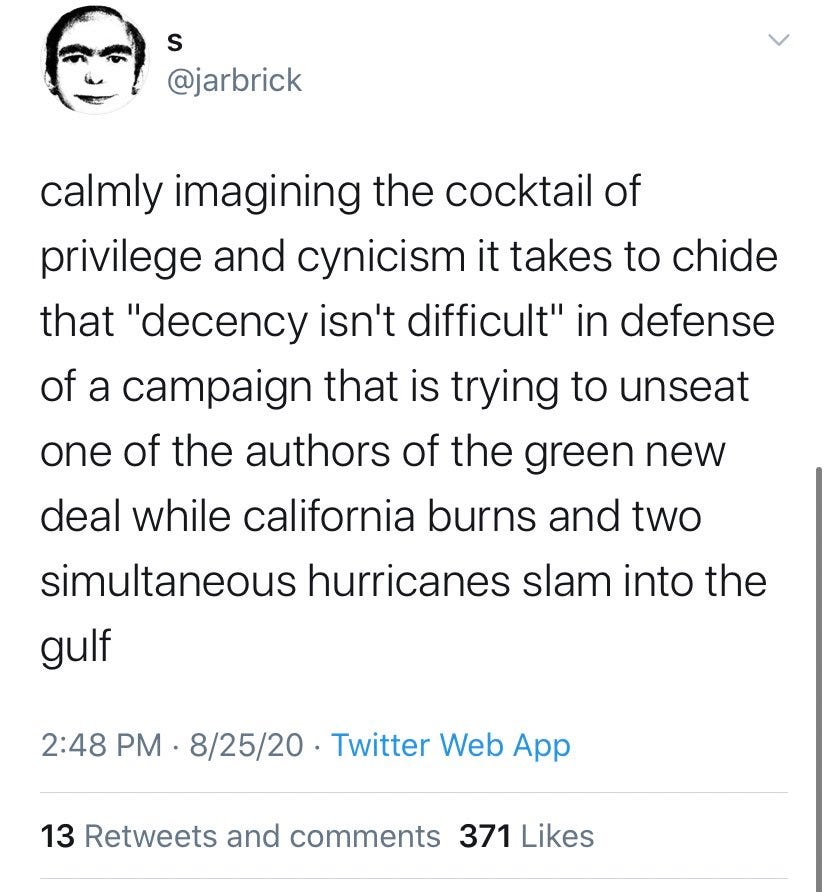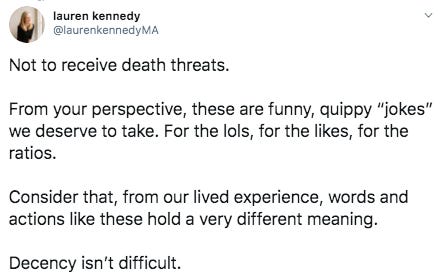I briefly mentioned in a previous post that certain forms of advocacy online are more prone to toxicity than other forms of engagement. Let’s take a minute to unpack that.
Before we get started—some completely obvious statements that I’m nonetheless going to type anyway because if I don’t people will get mad at me on the internet:
While the ratio of toxic to non-toxic supporters vary issue by issue, there are both good and bad supporters in every online political community.
Toxic supporters can not wholly discredit movements and we should not let their actions necessarily speak for an entire set of policies, politics, or even politicians.
Internet communities have existed since at least 1991, which means none of this is particularly new and therefore nobody reading this is necessarily to blame.
Pointing out that a thing exists is not a value judgement about the thing.
Now let’s talk a little bit about candidate and/or issue centered online advocacy.
First—some definitions.
When I use the phrase candidate centered advocacy, I’m using it as shorthand to describe online communities that spring up around individual candidates. It is a description for a type of support that is grounded first and foremost in a person, and the issues, insofar as they might matter to supporters, are not so central as to be the overriding concern—the candidate matters more than any one policy.
When I use the phrase issue centered advocacy, I’m using it as shorthand to describe online communities that are both a) organized around a particular issue and b) exist online regardless of whether or not a particular candidate is running. Supporters under this schema are invested in a candidate only insofar as it furthers their policy aim.
There are advantages and disadvantages to both models.
For instance, very few traditional campaigns keep their grassroots supporters engaged once the campaign officially ends. Since issue centered advocacy isn’t candidate or cycle dependent, the infrastructure and institutional memory created in one campaign is often used immediately in another. Supporters are consistently engaged online around new initiatives at the local, state, and federal levels and that extra engagement means this community is often more digitally fluent and easier to mobilize.
It also means that the online activists are less dependent on the campaign.
Candidate centered advocacy online usually has to be built from scratch and while that puts it at a significant disadvantage against issue centered advocacy, when built correctly it means the entire grassroots structure can be customized to fit the exact needs of the campaign—wasting fewer resources and filling key campaign weaknesses. For a campaign struggling with scaling, this sort of structure acts as a force multiplier.
It’s important to stop for a second right here and note that these two identities are not wholly separate and that there are always exceptions and these things exist on a spectrum.
But the further you travel along that spectrum, the more the incentive structure for each type of online advocacy changes. What is good praxis online for a issue based online advocate isn’t necessarily aligned with what’s best for the candidate longterm.
And we’re seeing this dynamic play out in Massachusetts.
(loud groan from the audience)
Stick with me, I promise I have a good point.
Senator Markey’s supporters are issue centered advocates and most of them are primarily organized around climate change. And we should be clear that this is exactly the sort of support that Markey actively sought out more than a year ago as a way to blunt the expected enthusiasm that everyone expected around the younger Kennedy.
(Washington Post) Edward J. Markey’s best chance of staving off a challenge to his Senate seat from a scion of the Kennedy family may lay with emphasizing his marquee issue: climate change.
(Boston.com) Within minutes of Kennedy formally announcing his Senate campaign Saturday morning, Markey called on the Massachusetts congressman and his two other Democratic primary challengers to agree to a debate specifically focused on climate change in November.
(Boston Globe) Now, those youthful and aggressive troops — one group staged a high-profile sit-in at House Speaker Nancy Pelosi’s office last year — could help him hold onto his Senate seat if he faces an expected primary challenge from Joseph P. Kennedy III.
Markey actively courted climate change advocates to boost his candidacy online to help counter the argument that generational change was needed—and that is not a value judgement, it’s an observation. But the Markey campaign also didn’t provide any sort of guidelines or rules of the road to govern these supporters behaviors—there are no fences separating the larger climate change movement from Markey’s campaign.
Which brings us back to the issue of toxic online communities.
I should start by saying that as both a Black person and a survivor of the great Tumblr Fandom Wars (2010-2013), I have a high bar for what I consider toxic online culture.
Tweeting death threats and assassination hopes to a Kennedy is toxic.

Replying to Kennedy tweets with a poorly drawn meme of a dinosaur saying “Fuck Joe Kennedy” is also toxic—for the record—it’s just less dramatic than death threats.
Meme-ing the memory of John F. Kennedy or Robert Kennedy and using their deaths as weapons to prod their family members does not serve an electoral aim. It is not helpful to the Markey campaign, as evidenced by the news cycles it produced, and it’s alienating to the Kennedy supporters, a lot of whom are people of color.
What it does do is use negative feedback loops online to keep supporters in engaged.
Remember how earlier we spoke about issue advocates waging continuous campaigns?
As any organizer would readily admit—it is really hard to keep supporters engaged online long-term. One way you can do that is by keep supporters’ emotions and tensions high. By making everything seem imminent and immediate. To have persistently high stakes with clearly cast villains and heroes. To make participation feel like a righteous crusade and engagement as easy as a clever tweet or sick burn.
Those dinosaur memes? They’re an inside joke from within the climate advocates that then jumped into the larger supporter pool and was then used last week to drown out the endorsement of a Black official who was switching his endorsement to Kennedy.
And I am sure that this all very fun for the supporters doing it and that it’s engaging for others to see—but this behavior does not help Markey in Massachusetts.
Disrespecting a Black male city councillor does not help Markey.
Accusing Kennedy of buying Black support does not help Markey.
But it does help keep the issue centered advocates engaged online and when this race is over none of these supporters will have to deal with whatever repercussions are left.
I don’t think the Markey campaign could stop it even if they tried.
In response to an appeal for decency, one of Markey’s online supporters tweeted:

I love this response because it is the purest example of why issue centered advocacy is more likely to turn toxic than candidate centered advocacy. If you believe that climate change is an immediate threat and is actively killing people right now then one woman crying for decency online means less than nothing. Who cares about your feelings when hurricanes are blowing and wildfires are burning and you’re running against this candidate?
You can justify a lot of toxic behavior when the stakes are literally life and death.
Candidate centered advocacy is rarely as toxic as issue centered advocacy because candidates would never purposefully build or tolerate toxicity at this level. Candidates are ultimately still people and they have to maintain relationships in their community even if they lose their elections. It matters to them if the Reverend or their banker or their city councilman thinks highly of them because they have to go back and live in those communities when the votes are counted.
Markey may very well successfully fend off Kennedy.
But regardless of the outcome there are going to be a lot of hurt feelings and burnt bridges that he and his staff are going to have to repair. Meanwhile the issue based advocates who came to his defense will be on to their next campaign.
How lovely for them.
If you liked what you read here and want to read more, tell your friends to sign up and spread the news. And yes, I saw those same spelling mistakes. You don’t have to point it out. You can sit quiet in the comfort of knowing that that mistake is eating me alive from the inside out.


